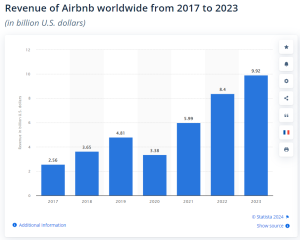Over the past few years, Airbnb has revolutionized the way people travel and stay away from home. With its growing popularity, many are considering venturing into the Airbnb business model as a potential source of income. However, before you become an Airbnb host, it’s crucial to ask this vital question: “Is starting an Airbnb business profitable for me, or is it a risky venture?”
This post aims to guide you through assessing whether starting an Airbnb business is worth it. Keep reading to find out more.
What is the Airbnb Business Model?
Airbnb (ABNB) is an online marketplace that connects homeowners wishing to rent out their properties with travelers or people searching for accommodations in specific locales. The Airbnb business model simply involves you renting out residential properties (either self-owned or leased) on a short-term basis through the Airbnb platform.
As an Airbnb host, you can list a variety of lodging options, including entire homes, shared rooms, and private rooms, as well as unique stays like treehouses and tiny homes. You will be able to catch the eyes of potential guests by presenting your property nicely on the platform and running some promotions if you feel like it. In addition, payments are processed directly through the Airbnb app ensuring a simple and safe transaction for you and your guests.
How to assess if the Airbnb business model will be profitable for you
Airbnb has experienced impressive growth over the years, reflecting its increasing dominance in the short-term rental market. After a revenue drop to $3.38 billion in 2020 due to the COVID-19 pandemic, the company rebounded to $5.99 billion in 2021. Revenue continued to rise to $8.4 billion in 2022 and $9.92 billion in 2023 (Statista). As we near the end of Q3 2024, Airbnb continues to perform impressively well.

This growth is not limited to Airbnb alone. In 2023, the global short-term rental market size was valued at $112.31 billion and is forecasted to surge to approximately $315.18 billion by 2033.
Overall, these statistics indicate that the demand for short-term rentals is increasing at a high pace and there are big opportunities available to both current and aspiring Airbnb hosts. As the industry grows, hosts can use this growth to expand their inventory of available listing types and attract more guests—which in turn will increase profits.
Yes, the Airbnb Business model seems to be really great and promising, however, it does not guarantee success for everyone. Your ability to make profits could easily be affected by several factors such as local regulations, market saturation, and a widely fluctuating demand. Additionally, the costs related to property maintenance, guest management, and platform fees can reduce your earnings.
So, how can you determine whether the Airbnb business model will be a profitable business idea for you before you start? Here are important steps to consider for assessing the potential success of your Airbnb venture:
1 Assess Market Trends and Local Demand
Research Local Rental Market
Begin by researching the local short-term rental market. Use tools like Airbnb itself, local real estate reports, AirDNA, and Zillow to check for current trends. Focus on collecting data about growth patterns, seasonal fluctuations, and emerging trends. For example, is there increasing demand for short-term rentals in your area, or is the market already saturated? Check the average nightly rates and occupancy rates—are they increasing? An increase can indicate a strong market. Additionally, pay attention to seasonal demand spikes; these can indicate whether your area is better suited for year-round rentals or just certain times of the year.
Next, determine the most in-demand property types. Are potential guests looking for entire homes, private rooms, or something else? Knowing the popular property types will make it easier for you to evaluate whether your property could fit into such market demand.
Finally, compare the number of Airbnb listings in your area with the number of travelers or potential guests. If there are more listings than guests, this could indicate that the market is oversaturated and might make profitability challenging.
Study Your Competition
So, studying your competition is paramount. Check other Airbnb listings around you, to know their pricing as well the rates at which they are occupied by guests. Look for patterns—are higher-priced listings getting booked more frequently? What are competitors not providing that there may be a need for and that you can offer? For instance, if the majority of listings in your area are budget-friendly, but you notice a lack of high-end accommodations available, perhaps this is a chance to appeal to an untapped market.
Additionally, examine the quality of your competition’s guest reviews. If you notice consistent complaints, take note—they could highlight areas where you can shine and win more guests. However, if the competition has overwhelmingly positive feedback and high occupancy rates, it could be a sign that breaking into the market may be difficult.
2. Calculate Potential Revenue
To gauge if starting an Airbnb business will be profitable, follow these steps to calculate your potential revenue:
Estimate Occupancy Rates
Start by estimating your potential occupancy rates. Use local data and benchmarks from platforms like AirDNA or Airbnb’s own analytics tools to see how often similar properties are booked in your area. You might also reach out to local hosts for insights. For example, if comparable listings in your area have an average occupancy rate of 70%, you might use this as a baseline.
Determine Average Nightly Rate
Look up the average nightly rate for Airbnb properties similar to yours —check comparable listings on Airbnb and other platforms. This will give you a realistic expectation of how much you can charge per night. Remember to consider factors like property size, location, and unique features that might affect pricing.
Project Revenue
Once you get the average nightly and occupancy rate for properties similar to yours, you can crunch the numbers to estimate your potential revenue. Multiply the average nightly rate by your estimated occupancy rate and then by the number of nights in a month to get your monthly income. In the Airbnb business, revenue is the total money you generate from renting out your property to guests before any expenses are deducted.
For example, if your property is booked 70% of the time and the nightly rate is $150, your monthly revenue would be approximately $3,150 = (30 days x 0.70 x $150). For a yearly projection, multiply the monthly revenue by 12. This calculation will provide a clear picture of your potential income and help you assess whether it meets your financial goals.
3. Calculate Start-Up and Ongoing Costs
Evaluating these costs will be useful in ascertaining your potential Airbnb profit margins. Consider the following costs:
Initial Investment Costs
First, evaluate all your upfront costs required to start the Airbnb business. This includes the costs of buying or leasing a property. Paying a high price for the property can impact your Airbnb business profit margins, so make sure it fits into your budget and financial expectations. Also, account for renovation and furnishing expenses needed to attract guests.
Ongoing Operational Costs
Calculate the costs of maintaining the unit, paying for cleaning services, utilities, taxes, insurance, and property management fees. These costs are integral to maintaining your property’s reputation and guests’ satisfaction but can add up quickly over time.
Platform Fees
Familiarize yourself with Airbnb’s fee structure which includes booking fees and service fees. These fees are deducted from your earnings, so make sure to include them in your calculations, as high fees can reduce your Airbnb profit margins.
4. Calculate Profit Margins
Profit margin is a financial metric that shows the percentage of revenue that remains as profit after all expenses have been deducted. Determining your estimated profit margins will allow you to predict whether or not the Airbnb business is likely going to make money. Here’s how to do this:
Calculate Expected Net Income
Subtract your projected total expenses, including start-up and ongoing costs, from your projected revenue. If the costs are high compared to income, it suggests a low Airbnb profit margin and may point to a potentially unprofitable venture.
For example: If your estimated total expenses are $8000 and revenue is $10,000:
Then, Expected Net Income= Revenue ($10,000) – Total Expenses ($8000)
= $2000
Calculate Profit Margin
You can calculate this by using this formula: Profit Margin = (Net Profit/ Revenue) ×100
For example: If your revenue is $10,000 and your net profit is $2,000
Then, Profit Margin = (2000/10,000) ×100 =20%
A higher profit margin indicates a more profitable and financially healthy business. You can also use online calculators to estimate your earnings.
5. Know Local Regulations and Compliance
Before you become an Airbnb host, research local regulations and compliance requirements. This includes:
- Zoning Laws and Permits: Verify if short-term rentals are permitted in your area and obtain necessary permits.
- Safety and Health Regulations: Make sure your property meets all safety and health standards, such as smoke detectors and sanitary conditions.
- Tax Implications: Learn about the taxes surrounding rental income and make sure that you are following local tax laws.
Staying on the right side of local laws keeps you out of trouble and prevents fines that could eat into your profits.
6. Assess Personal and Operational Considerations
Consider the following:
Time Commitment
Evaluate the time required to manage your Airbnb property, including guest interactions, maintenance, and administration. If the time investment is significant and not aligned with your other commitments or income expectations, it may impact the overall profitability. Make sure you’re ready to dedicate the necessary time to ensure smooth operations and guest satisfaction.
Guest Experience
Make sure you can consistently deliver a high-quality guest experience. Positive reviews and repeat bookings are crucial for maximizing revenue. If you can’t meet guest expectations or handle guest-related issues effectively, it might affect your Airbnb profit margin.
Long-Term Viability
Consider whether this venture aligns with your long-term goals and lifestyle. Evaluate if you’re prepared for the ongoing responsibilities and challenges. If the Airbnb business model doesn’t fit your objectives or resources, it could impact profitability and sustainability.
By thoroughly assessing these factors, you can better determine if starting an Airbnb business is a profitable venture for you.
7. Seek Professional Advice
Seek more advice from financial advisors, real estate experts, or seasoned local Airbnb hosts. Experts can provide insightful guidance on regional market dynamics, financial forecasts, and operational tactics. Their advice will help you create a strong Airbnb business plan and make an informed choice. A well-crafted business plan and roadmap are essential for navigating challenges and maximizing profitability in the competitive short-term rental market.
Final Thoughts
Conduct an in-depth inquiry to see if the Airbnb business model can be profitable for you based on your location. If the outlook is positive, create a thorough Airbnb business plan and business roadmap to direct your strategy. Most importantly, to get helpful advice and improve your plan, speak with financial professionals, real estate experts, or experienced local Airbnb hosts.




